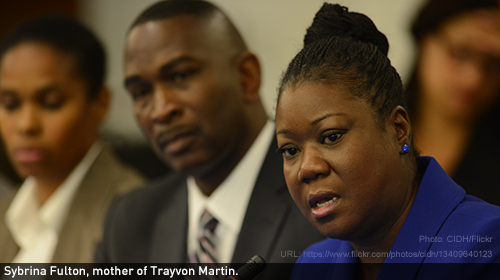Parents of Trayvon Martin, Jordan Davis Share Their Loss at the United Nations


Sitting in meetings in the United Nation's ornate Wilson Palace by the shores of Lake Geneva in the shadow of the Alps seems an odd place to discuss racial discrimination in the United States.
But the problems of racial discrimination quickly hit home at an event earlier this week that hosted the parents of Travon Martin and Jordan Davis, two unarmed young black men killed by armed white men claiming to be acting in self-defense. Made all the more powerful as it came on the heels of the shooting of Michael Brown in Ferguson, Mo., their affecting and often harrowing testimony immediately erased the distance between Switzerland and the United States. It made the discrimination present and underscored the importance of the work being done here at the U.N.'s review of the U.S. record of racial discrimination.
The event hosted by the U.S. Human Rights Network came just before the start of the U.N. review of U.S. compliance with the (CERD), which was ratified by the United States in 1994. Jordan's father and Trayvon's mother described their loss, unimaginable to any parent, with grace and a fierce determination to make sense of senseless acts. Recounting their families' memory of and love for their slain relatives, both parents expressed frustration and bewilderment over the failure of their sons' assailants and much of society to recognize the value of their sons' lives.
This theme of the devaluation of the lives of people of color ran throughout the comments of all of the speakers. They described their own and othersтАШ experiences, of immigrant child agricultural laborers working without the protections offered children in every other type of employment; black and brown women incarcerated for lengthy periods pursuant to unfair drug laws; black girls prescribed powerful and harmful psychotropic drugs based on behavioral expectations shaped by racial and gender stereotypes; families of color subjected to predatory, toxic mortgages; foreign workers subjected to virtual slavery by a severely flawed American guest worker program that invites labor trafficking and other abuses; and unarmed children shot after arguments about the volume of radios or for being perceived as a threat simply while walking down the street. Each instance described how people of color are denied their right to enjoy childhood, even their very right to life itself.
Civil and human rights are rooted in a belief in the fundamental value of every individual regardless of race or ethnicity. The advocates in Geneva appear before the United Nations in frustration and hope тАУ frustration at the failure of the U.S. government to sufficiently assure the rights of all of its residents, and hope that pressure from the can assure American treaty compliance and affirm the fundamental value of all individuals.
Learn more about racial discrimination and other civil liberties issues: Sign up for breaking news alerts, , and .

